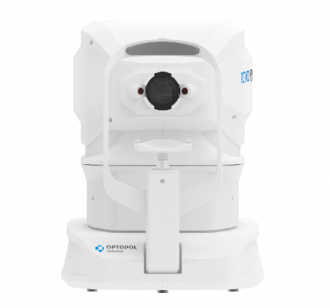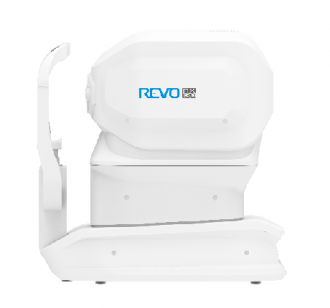Categories
![]() Click here to view the pdf catalogue
Click here to view the pdf catalogue
Optopol engineering team, designers of the first commercially available Spectral Domain OCT in the World, is proud to present the World’s fastest OCT.
Optopol engineering team, the designers of the first commercially available Spectral Domain OCT in the world, are proud to present the latest innovation, the world`s first B-OCT and T-OCT for standard
posterior OCT. Our supreme experience in Spectral Domain OCT allows us to provide the market with a state of the art instrument which comes with new advanced technologies and remarkable simplicity of operation.
New OCT standard - All functionality In One device.
Once again Revo NX goes beyond the limits of standard OCT. With its new scanning speed, our Revo NX 130 enables a full functionality scanning from the retina to the cornea. It brings benefits by combining the potential of several devices. With REVO you can measure, quantify, calculate and track changes from the cornea to the retina over time with just one OCT device.
i Tracking™
iTracking™ technology compensates involuntary eye movements and blinks. When OCT scan is used each anatomical region is acquired twice automatically. The system immediately creates an artifactfree MC examination using the Motion Correction TechnologyTM. The elimination of eye movement and blinking artifacts ensures the highest resolution of Angio OCT images without patient inconvenience. Clear OCTA data set allows easier interpret retina vasculature condition.
RETINA
Single 3D Retina examination is enough to perform both Retina and Glaucoma analysis based on retinal scans. Software automatically recognize 8 retina layers. Thus allowing a more precise diagnosis and mapping any changes in the patient’s retina condition.
OCT Angiography
This optional software module allows visualization of the retinal microvasculature. Angiography SOCT is a non-invasive, dye-free technique providing 3D image of retinal blood circulation.
ANGIO ANALYISIS METHODS
QUANTIFICATION
The quantification tool provides quantification of the vasculature in the whole analyzed area together with values in specific zones and sectors. Thanks to the heat map of the analyzed vasculature the evaluation of vascular structure conditions is much faster. The choice of the quantification method increases the sensitivity of analyses for specific deseases.
Available quantification methods:
- Vessel Area Density - it is defined as the total area of perfused vasculature per unit area in a region of measurement.
- Skeleton Area Density - it is defined as the total area of skeletonized vasculature per unit area in a region of measurement.
Quantification is available for a specific layer in Angio OCT exam:
- Retina: Superficial Plexus and Deep Plexus
- Disc: RPC - Radial Peripapillary Capillary
ANGIO-ANALYTICAL TOOLS
FAZ – Foveal Avascular Zone measurements enable the quantification and monitoring of changes in Superficial and Deep vascular layers. The FAZ tool is also available for narrow and wide scans.
VFA – Vascular Flow Area allows the user to examine the pathologically affected area and to precisely measure the area covered by vascularization.
The simple and easy area measurement can be performed on a predefined or user-selected vascular layer.
NFA – Non Flow Area measurement tool makes it possible to quantify the Non Flow Area on the OCT Angio examination. It provides the sum of all marked areas.
ANGIO MOSAIC
The Angiography mosaic delivers high-detailed images over large field of the retina.
Advanced tab provides: view of any vascular layers, enface view of vascular layers, depth coded and thickness map. Mosaic modes: 10x6 mm, 12x5 mm, 7x7 mm, 10x10 mm and Manual (up to 12 images).
GLAUCOMA
Comprehensive glaucoma analytical tools for quantification of the Nerve Fiber Layer, Ganglion layer and Optic Head with DDLS allow for the precise diagnosis and monitoring of glaucoma over time.
With the golden standard 14 optic nerve parameters and a new Rim to Disc and Rim Absence the description of ONH condition is quick and precise.
Advanced view which provides combined information from Retina and Disc scan to integrate details of the Ganglion cells, RNFL, ONH in a wide field perspective for comprehensive analysis.
Advance Retina & ONH |
ONH Single |
 |
 |
Asymmetry Analysis of Ganglion layers between hemi-spheres and between eyes allows easier identification and detection of glaucoma in early stages and in non-typical patients.
Ganglion Both |
Ganglion Progression |
 |
 |
Implemented the DDLS - Disc Damage Likelihood Scale which use 3 separate classification for small, average and large discs. It supports the practitioners in a quick and precise evaluation of the patient’s glaucomatous disc damages.
ONH Both |
ONH Progression |
 |
 |
COMPLETE YOUR GLAUCOMA REPORT
To eliminate common problem with the understanding of the patient’s IOP pachymetry module provides IOP Correction value. With the implemented Adjusted IOP formula you can quickly and precisely understand the measured IOP value.
As the Pachymetry and Anterior Chamber Angle Verification require no additional attachments, the predefined Glaucoma protocol, which consists of Retina, Disc and Anterior scans, can be done automatically to reduce patient chair time.
Closing angle |
Anterior single view |
 |
 |
| * Images courtesy of Prof. Edward Wylęgała MD, PhD | |
COMPREHENSIVE GLAUCOMA SOLUTION
STRUCTURE & FUNCTION - Combined OCT and VF results analysis
Invaluable combination of information about the functional quality of vision with comprehensive data on retinal Ganglion Cells, RNFL and Optic Nerve Head for both eyes on a single report page. The S&F report contains the following:
- VF sensitivity results (24-2/30-2 or 10-2)
- Total and Pattern Deviation probability graphs for VF results
- Reliability and Global indices for VF results
- Combined map of Structure & Function
- Ganglion cell analysis (GCL+IPL or NFL+GCL+IPL)
- ONH and NFL analysis including charts and comparison tables
- NFL Asymmetry Plot
The S&F report compares in a natural way the anatomical relationship between VF and RNFL/Ganglion maps.
| Structure & Function |
 |
SINGLE PAGE REPORT
S+F provides a quick and comprehensive single page report for glaucoma management.
ANTERIOR
For standard examinations no additional lens is required. Additional adapter provided with the device allows to make wide scans of anterior segment.
Cornea single |
Cornea both |
 |
|
| Cornea Comparison | Cornea Progression |
BIOMETRY OCT is optional software module to purchase
B-OCT™ innovative method of using the posterior OCT device to measure ocular structure along eye axis.
OCT Biometry provides complete set of Biometry parameters: Axial Length AL, Central Cornea Thickness CCT, Anterior Chamber Depth ACD, Lens Thickness LT.
Result review |
Analysis window |
Visually verify your measurement
All measurement calipers are shown on the all boundaries OCT image provided by REVO. Now, you can visually verify and correct what structure of the eye has been measured.
TOPOGRAPHY OCT is optional software module to purchase
T-OCT™ is a pioneering way to provide detailed corneal Curvature maps by using posterior dedicated OCT. Ante-rior, Posterior surface and Corneal Thickness allow to provide the True Net Curvature information. With Net power, the precise understading of the patient’s corneal condition comes easily and is free of errors associated with modelling of posterior surface of the cornea. SOCT T-OCT module provides Axial maps, Tangential maps, Total Power map, Height maps, Epithelium and Corneal thickness maps.
Corneal topography module clearly shows the changes in the cornea on the difference map view. Customize your
Topography module provides:
- Full featured Corneal mapping of Anterior, Posterior and Real
- Precise Astigmatism Display Option (SimK: Anterior, Posterior, Real, Meridian and Emi-Meridian ø 3, 5, 7 mm zones
KERATOCONUS SCREENING
Easly detect and classified keratoconus with Keratoconus classifier. Classification based on KPI, SAI, DSI, OSI and CSI. In the early stages of kera-toconus the results can be complemented by Epithelium and Pachymatery maps.
Normal |
Astigmatysm |
Keratoconus |
 |
COMPARE THE EXAMS
Comprehensive software features a range of selectable views: Single, Both. See details on standard Singe view and easly see corneal asymmetry on the Both view.
The follow-up feature in to the T-OCT™ module, allows fully compare the changes in the corneal topography over time for:
- LASIK undergone patients
- Keratoconus patients
- The contact lens wearers
| Single | Both |
 |
 |
| Comparison | Progression |
FOLLOW UP
High density of standard 3D scan allows to precisely track the disease progress. Operator can analyze changes is morphology, quantified progression maps or evaluate the progression trends.
| Progression Morphology | Progression Quantification |
 |
 |
COMPARISON
Comparison view allows in easy and convince way to review results from two visits. The view is available for most of the scan programs.
 |
NETWORKING
A proficient networking solution increases productivity and an enhanced patient experience. It allows you to view and manipulate multiple examinations from review stations in your practice. Effortlessly helping to facilitate patient education by allowing you to interactively show examination results to patients. Every practice will have differing requirements which we can provide by tailoring a bespoke service. There is no additional charge for the server module.
DICOM
Store, exchange, and transmit results through DICOM gateway to the hospital network.
| CNV | BRVO |


ENHANCE TOMOGRAMS - 2 µm Ultra High (Digital) Resolution


Wide cornea scan, Descemet’s membrane detachment (DMD) and iridocorneal adhesions
* Images courtesy of Prof. Edward Wylęgała MD, PhD
ANTERIOR

Anterior scan, Cornea Guttata with corneal scaring
* Images courtesy of Prof. Edward Wylęgała MD, PhD
ANGIOGRAPHY
 |
 |
 |
PDR, Angio Mosaic mode: 10x10 mm

*Images courtesy of Bartosz L. Sikorski MD, PhD
ANGLE TO ANGLE ANALYSIS

Angle to Angle scan, narrow angles

*Image courtesy of Bartosz L. Sikorski MD, PhD














